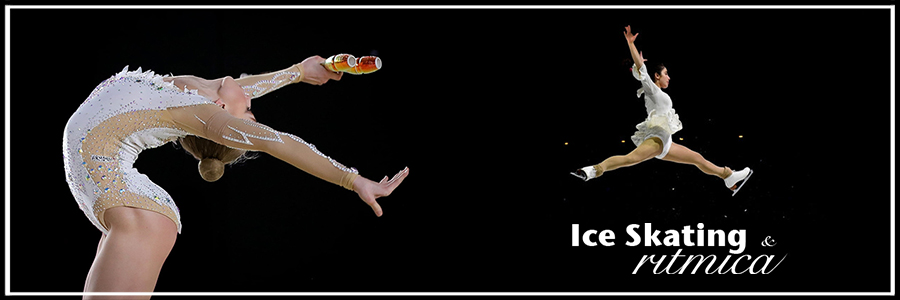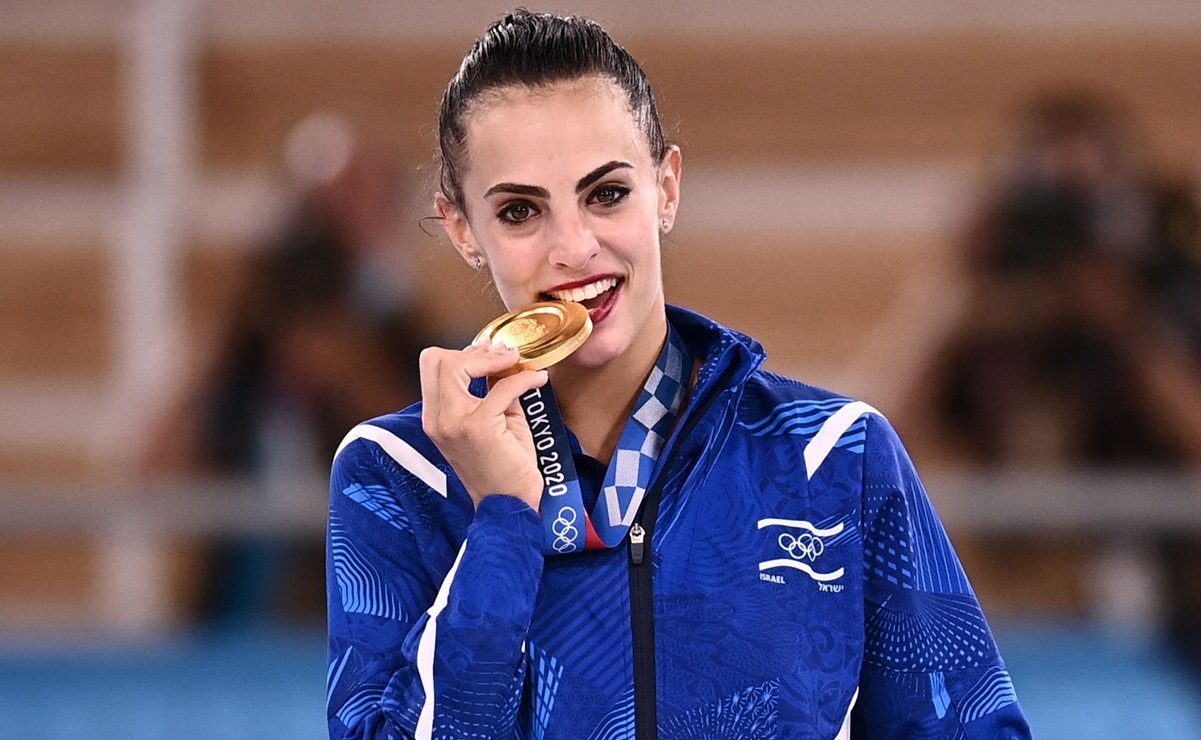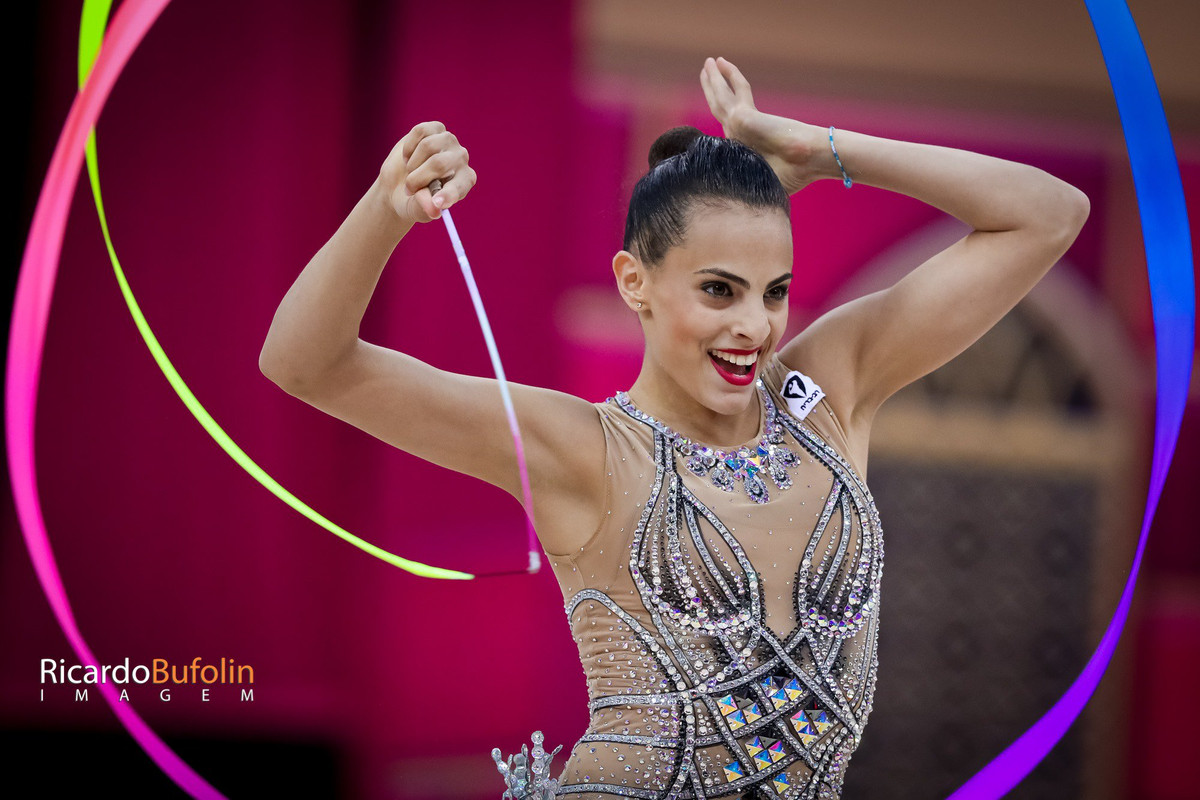|
|
|
"Amo essere diversa dalle altre ginnaste "
L'oro olimpico Linoy Ashram parla del suo viaggio verso la vetta della ginnastica ritmica, del dramma delle rivali russe durante il punteggio a Tokyo e del fatto che lei sfida l'immagine associata col suo sport.
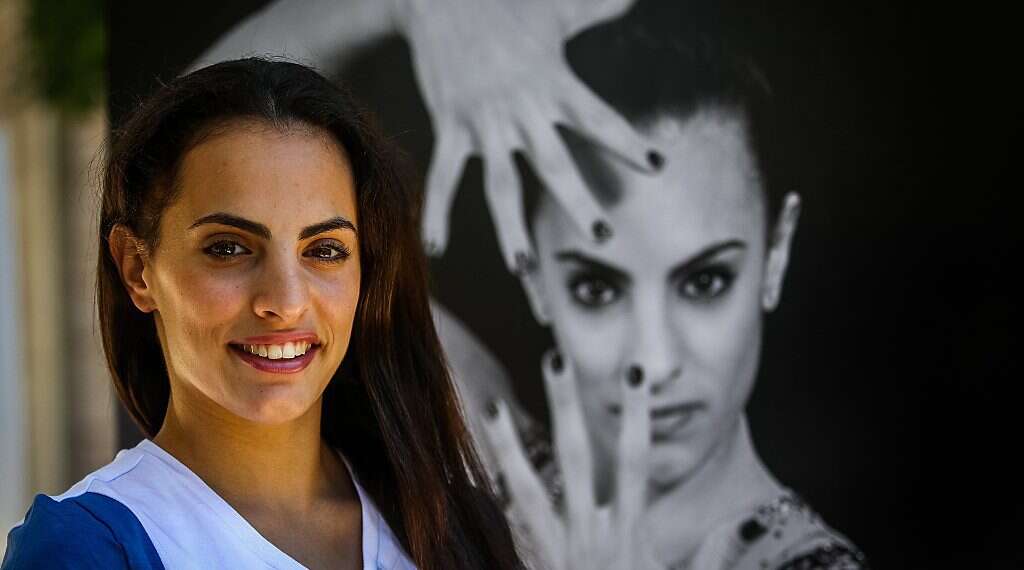
Photo: Oren Ben Hakoon
Fonte
di Eran Navon and Shir Ziv
15.08.2021
"Ancora non riesco a capire", una stanca Linoy Ashram, appena coniata campionessa olimpica, dice con un sorriso, poco dopo essere atterrata in Israele mercoledì. La sua città natale, Rishon Letzion, l'ha accolta con poster che riportano la sua immagine, così come quelli delle medaglie olimpiche Peter Paltchik e Artem Dolgopyat, in tutta la città.
Un gigantesco "Benvenuta a casa" è stato appeso al modesto edificio in cui risiede la famiglia Ashram. L'appartamento stesso è pieno di fiori, cioccolatini e palloncini che riflettono l'orgoglio per la prima donna israeliana a vincere una medaglia d'oro nella ginnastica ritmica.
"Sto ancora vivendo il sogno", dice. "Solo ora, lentamente, sto cominciando a capire la grandezza del risultato. Sono venuta a Tokyo con l'obiettivo di dare il massimo e vivere il momento e la sensazione di essere lì, alle Olimpiadi. Sapevo che, se avessi fatto bene, sarei potuta tornare con una specie di medaglia, ma non immaginavo di che colore sarebbe stata. L'idea che fosse d'oro non mi è venuta in mente."
Cosa hai provato dopo i momenti di tensione nell'attesa del punteggio della tua rivale, la russa Dina Averina?
"Ho pianto. Ho pianto con Ayelet [l'allenatrice di Ashram] e ho pianto quando sono stata raggiunta in un'intervista da mia madre e mio padre, e ho pianto durante la mia prima conversazione con il mio ragazzo. Mi ha detto quanto fosse orgoglioso di me e quanto mi amava. Sono stati momenti incredibili. Ho avuto un grande e lungo abbraccio con Ayelet. Fino a che punto eravamo arrivate a questo momento, quanto mi aveva tenuto.
Eravamo così felici e siamo ancora così felici. Alla premiazione, quando ho visto i miei amici della delegazione israeliana che erano rimasti, quando li ho sentiti applaudire e cantare l'inno, è stato uno dei momenti più commoventi della mia vita.
Quella notte, dopo che mi hanno assegnato la medaglia, non ho dormito affatto. Forse ho sonnecchiato per 40 minuti. La medaglia era sempre accanto a me."
Credi in Dio?
"Sì. Sono andata con Ayelet al Muro del Pianto prima di volare in Giappone e ho messo un biglietto lì. Accendo le candele lo Shabbat, digiuno a Yom Kippur, e recito 'Shema Yisrael' tra me e me prima di ogni routine
Due settimane fa, quando era appena atterrata in Giappone, le cose non erano così rosee per Ashram. Nella seconda notte per lei e la squadra che l'accompagnava, mentre erano ancora nel campo di allenamento nella città di Ichihara, il suo allenatore Ayelet Zussman ha sentito che qualcosa non andava.
"Quando siamo arrivati in Giappone, una settimana prima della competizione, abbiamo passato notti in bianco", ricorda Zussman. "Quella notte non riuscivo a dormire a causa del jet lag e mi sentivo che anche Linoy era sveglia. Alle 4:30 del mattino, ho deciso di controllare quando era l'ultimo accesso su WhatsApp e ho visto che era online. Venti minuti dopo, ho visto che era di nuovo su WhatsApp e ho capito che non riusciva a dormire.
Siamo salite sul tetto dell'hotel. La città era spalancata davanti a noi, la mattina stava iniziando e abbiamo avuto una conversazione a cuore aperto, durante la quale lei mi ha raccontato di tutta la pressione a cui era sottoposta."
Cosa ti ha detto?
"Che era stressata, che aveva paura di deludere il paese e anche me. L'ho calmata e ho detto: 'Non mi deludi. Il percorso che hai preso, che abbiamo preso, fino a ora, questo è l'importante, qui devi solo divertirti». Le ho detto quanto avessi fiducia in lei, nelle sue capacità, in chi è.
Abbiamo ricordato i suoi successi negli ultimi anni e da quella notte ho visto che le cose si sono liberate in lei. Tutto è passato. Il suo funzionamento è migliorato, ha dormito bene la notte, ho sentito che si è calmata."
La campionessa olimpica sorride. "Ayelet mi percepisce in ogni momento, forse mi capisce anche più di mia madre. Senza dire una parola, sa che non mi sto addormentando, sa cosa dirmi. È così premurosa nei miei confronti.
Anche le altre notti, si è seduta con me fino a quando non mi addormentavo. È davvero speciale. Nel complesso, non so come avrei superato il periodo del corona senza di lei. Sono sicura che sarebbe stato molto più difficile superare quest'anno il rinvio delle Olimpiadi, che sostanzialmente significava fare un altro anno di allenamenti e gare, fino all'apice".
Dopo quattro giorni a Ichihara, sono arrivate in un appartamento con quattro camere da letto nel Villaggio Olimpico di Tokyo. Quattro donne sono rimaste lì: Ashram, la brillante Nicole Zelkman, arrivata anch'ella in finale, Zussman, ed Ela Samofalov, coach di Zelkman. Una squadra unita, amorevole e solidale l'una con l'altra. Ognuno di loro aveva la propria stanza. Stavano insieme quando volevano, e quando ne avevano bisogno si ritiravano nella loro camera da letto, per stare un po' sole.
Quando sono arrivati a Tokyo, Zussman ha chiesto più supporto mentale per Ashram, questa volta da parte di Ofek (21), il suo ragazzo.
"Ho cercato, per quanto ho potuto, di isolare Linoy da tutto il rumore che la circondava", spiega."Ma sapevo quanto fosse importante per lei il suo cellulare, grazie al quale ha ricevuto sostegno dalla sua fantastica famiglia, dai suoi amici e dal suo ragazzo, che è davvero il sale della terra. Gli ho chiesto di impostare una sveglia, così avrebbe chiamato Linoy ogni notte all'1:30 ora israeliana. A Tokyo erano le 7:30 del mattino, quindi è così che ha iniziato la giornata, con un 'buongiorno' dal suo ragazzo e un grande, dolce sorriso. Sapevo quanto sarebbe stato bello per Linoy e lui è fluito con me ed è stato brillante."
All'inizio delle qualificazioni, Ashram ha avuto un errore nella sua prima routine con il cerchio.
"Ayelet sapeva esattamente cosa dirmi in modo che mi concentrassi di nuovo", Ashram, che ha concluso al 15° posto, salendo al terzo posto entro la fine delle qualifiche, ricorda. "Mi ha detto 'Linoy, calmati, l'obiettivo qui è solo arrivare in finale, solo tra i primi 10. Hai altre tre routine da superare, per fare tutto nonostante quello che è successo.' Dopo mi sono sentita completamente concentrata e pieno di obiettivi, e non ho pensato a niente a parte le routine."Ho continuato solo a fare del mio meglio, con l'obiettivo di arrivare in finale."
Cosa hai fatto la sera tra le qualificazioni e la finale?
"Io, le gemelle russe e le ginnaste bielorusse siamo rimaste nell'arena per allenarci. Eravamo solo noi. Non so perché siano venute; sono venuta per ripassare i miei esercizi. Dopo ho cenato e ho parlato con Ayelet su quello che era successo nelle qualificazioni e su come potessi rialzarmi per dare il massimo in finale. Abbiamo parlato di quanto sia importante rialzarsi con nuove e buone energie."
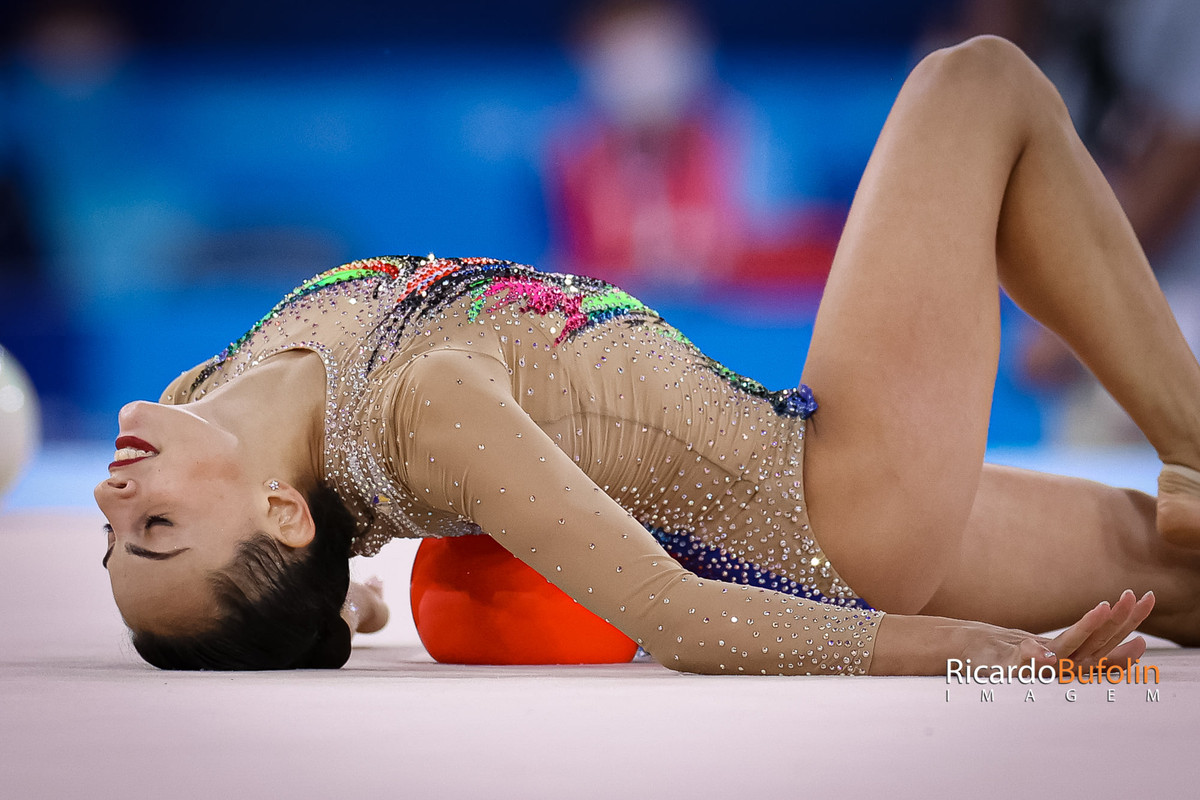
Occhi sul premio.
La mattina della finale, Ashram e Zussman si sono svegliati di buon umore.
"Abbiamo messo su canzoni divertenti e ritmate, abbiamo fatto colazione, compreso l'ananas, che era la cosa più gustosa che ho mangiato lì, ballato ed ero felice", dice Ashram. "Siamo state insieme tutto il tempo, Nicole, la sua allenatrice Ela, Ayelet e io. Ho davvero raggiunto la finale con il miglior umore possibile."
Sei andata in finale con l'obiettivo di vincere l'oro?
"No. E non mi sentivo sulla buona strada per la medaglia d'oro. Sapevo che c'erano russe e bielorusse e ogni volta che ero prima in classifica, sapevo che era non è finita.
Durante le routine, ho capito che avrei ottenuto una medaglia, e dopo la routine del nastro sapevo di essere al primo posto, e poi è stato follemente stressante. L'attesa è stata uno dei momenti più tesi della mia vita, e loro suonavano con la batteria in sottofondo. Ma sapevo che non importava cosa, avevo una medaglia olimpica. Ero terza in molte competizioni, dopo i russi, quindi l'atto stesso di vincere una medaglia è stato un successo e ho solo aspettato di vedere il risultato."
"La tensione era enorme. Nicole mi sussurrò all'orecchio: "Abbiamo realizzato un sogno, non importa quale sia il punteggio, hai vinto una medaglia e hai dato il massimo". Siamo sempre così, ci solleviamo a vicenda e nel corso della gara siamo stati un quartetto unito, insieme agli allenatori. Non c'è mai stato un legame così forte, sia tra allenatori che tra ginnaste. Ci aiutiamo a vicenda e anche Ela, l'allenatore di Nicole, mi ha sollevato dopo la routine al cerchio delle qualificazioni."
Cosa hai pensato dopo aver lasciato cadere il nastro nell'ultima routine? Il pensiero "Ho rovinato tutto" ti è passato per la testa?
"Ero pessimista. Sentivo che forse avrebbe danneggiato il mio punteggio finale e mi avrebbe fatto scendere un po' in classifica, ma ho continuato perché sono così, dò il massimo anche quando qualcosa non va bene e c'è un intoppo. A un certo livello, mi resetto anche, ed è anche quello che è successo con il nastro. In un secondo sono riuscita a tornare in me stessa. Dopo la routine Ayelet mi ha detto che il mio livello di difficoltà era davvero alto e che l'errore non avrebbe dovuto danneggiare troppo il mio punteggio, e aveva ragione."
Le tue principali rivali, le gemelle russe Dina e Arina Averina, non hanno preso così bene la sconfitta. Hai parlato con loro?
"Alla fine della finale mi sono avvicinata a Dina, che è arrivata seconda, e volevo congratularmi con lei. Ma piangeva e non era in grado di parlare. Da allora, non c'è stata l'opportunità di parlare o di mettersi in contatto con tutti. Alle competizioni ci salutiamo e ci auguriamo buona fortuna l'un l'altra, e dopo la competizione ci congratuliamo l'un l'altra alla fine."
Cosa ne pensi delle critiche dalla Russia, delle affermazioni sui giudici e dell'appello?
"Non mi occupo di quello che dicono gli altri. Ho raggiunto il mio traguardo, ed è mio insieme ad Ayelet e al team di professionisti. Chi vuole può dire quello che vuole, sono contenta di quello che ho ottenuto.
Ai Mondiali del 2018, il nastro di Dina è caduto e mi ha comunque battuto. Non abbiamo detto una parola. Questo è il giudizio, e quelle sono le Olimpiadi. Cioè, il giudizio più giusto che ci sia. Ho anche sentito dire che Dina ha detto che non è colpa mia."
Hai ricevuto risposte brutte? Antisemitismo? Qualche tipo di accusa?
"Non so perché si debba raggiungere il livello dell'antisemitismo. Ci sono persone che pensano in un modo e ci sono persone che pensano in un altro modo."
Hai visto la sfida russa di Tiktok che cerca di ridicolizzarti?
"Non l'ho vista. Succede perché non ci sono abituati. Le loro ginnaste vincono sempre, e all'improvviso è successo. Forse pensavano che l'oro fosse nelle loro tasche."
Pensi di aver dimostrato qualcosa a coloro che non credevano in te?
"Penso di sì."
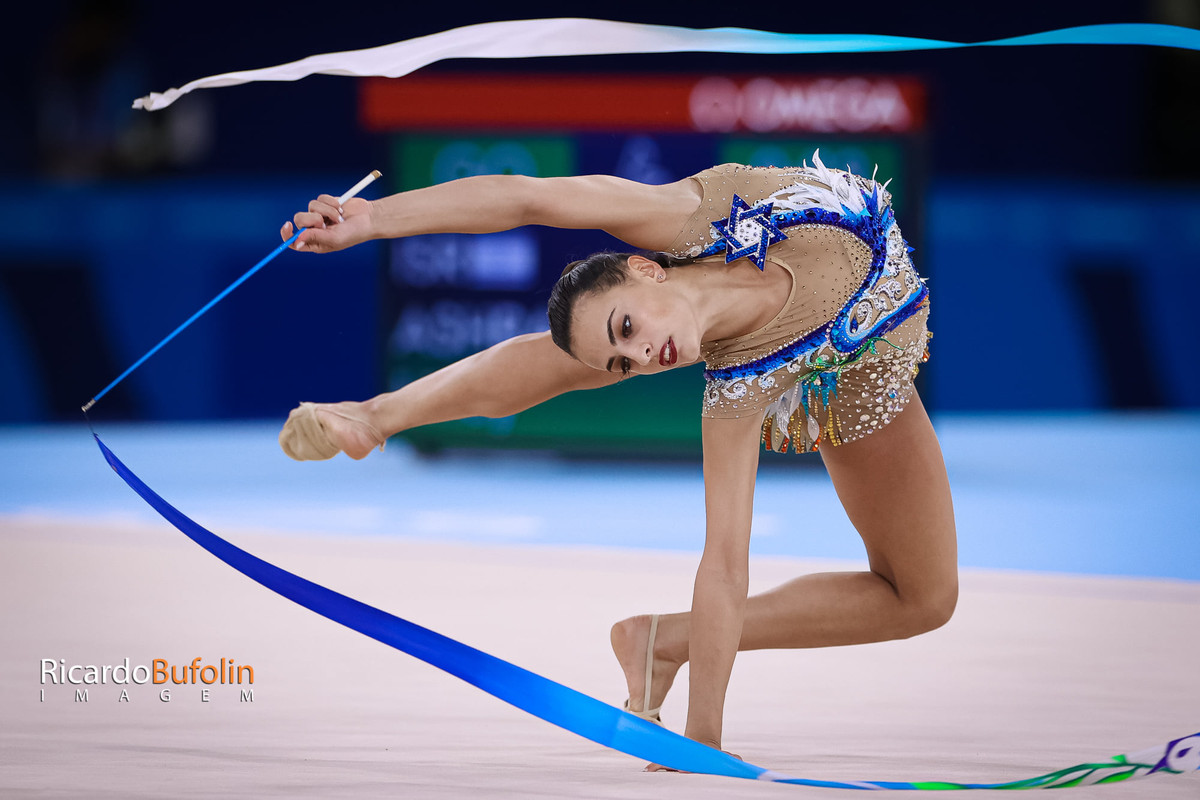
Prima della competizione, hai visto l'oro di Artem Dolgopyat?
"Certo. Ci siamo seduti insieme in allenamento e abbiamo guardato la finale di Artem, e quando ha vinto siamo saltati in piedi e siamo impazziti. Abbiamo chiamato per congratularci con lui subito dopo, è stato così bello sapere che qualcuno era riuscito a vincere l'oro. Sapevamo che era capace, aveva solo bisogno di eseguire la sua routine migliore."
La sua medaglia ti ha incoraggiato?
"Sì. Mi è passato per la testa il pensiero che la volevo anch'io, che volevo già gareggiare. Artem aveva gareggiato, l'aveva già sperimentato, e ancora non eravamo stati al Villaggio Olimpico, perché noi siamo arrivate solo il 2 agosto."
C'è stato un cambiamento nelle regole che ti ha aiutato a raggiungere il tuo picco?
"Dal 2017 le regole hanno iniziato a cambiare per il vantaggio di lavorare con l'attrezzo. Più sei veloce, più il tuo livello di difficoltà aumenta e puoi soddisfare di più i requisiti. Prima c'era una restrizione sugli elementi nella routine . In termini di salto, in passato era sempre possibile fare più salti, ma in passato non pensavamo di farlo."
E per quanto riguarda la musica nelle diverse routine? È davvero scelta così attentamente?
"A Tokyo abbiamo scelto la canzone Big in Japan, ovviamente per via del paese ospitante, e Hava Nagila per il suo significato e il fatto che è sinonimo di Israele. È una canzone con cui ho lavorato per un anno. A parte questo, sono una fan di Beyonce e avevo due delle sue canzoni. A proposito, per quanto riguarda l'aspetto esteriore, per le gare mi trucco e mi faccio i capelli da sola."
Linoy è già arrivata a Tokyo con un guardaroba pieno di medaglie: medaglie d'argento e di bronzo ai Mondiali 2018 e 2019, una medaglia d'oro, d'argento e di bronzo agli Europei 2020 e medaglie di bronzo agli Europei 2017 – solo per citarne alcune...
Quelli che l'hanno aiutata per tutto il percorso sono i suoi genitori, Oren (49), un soldato dell'IDF in piedi, e Hedva, una maestra d'asilo, le sue sorelle Chen (25) e Hila (9) e suo fratello Idan (24).
"Mia madre ha creduto in me per tutta la mia vita", dice, "Quando mi ha portata in palestra per la prima volta, ha detto al mio allenatore: 'Vedrai, questa sarà l'israeliana Nadia Comaneci'. L'allenatore pensava che mia madre non capisse, perché Comaneci era una ginnasta di artistica, ma mia madre lo sapeva, lo diceva solo per i suoi successi.
Quando avevo 13 anni, ho attraversato una crisi. Ne avevo avuto abbastanza e ho smesso, e ricordo che all'improvviso non capivo perché avessi bisogno di tutto questo. Sentivo di meritare di essere una persona diversa. Ho deciso che volevo passare al nuoto, ma dopo un mese ero stanca di passare tutto il giorno in acqua. Ho sentito che mancava qualcosa, che non era quello che volevo, così sono andata da mia madre e ho pianto perché mi riportasse a ginnastica."
A Tokyo, eri in stretto contatto con i tuoi genitori?
"Ho cercato di inviare loro foto e di parlare con loro. Preferisco le foto su WhatsApp e non le chiamate vocali, perché mi capiscono, e prima delle gare mi danno spazio e cercano di disturbarmi il meno possibile. Loro hanno paura che mi impedisca di concentrarmi, ma quando invio qualcosa rispondono immediatamente."
Avresti preferito che fossero stati lì con te? E in generale, che le gare si svolgessero davanti a un pubblico dal vivo?
"Sì, una competizione con i fan è più divertente. Ma ero concentrata su me stesso e sulla competizione, quindi non mi ha cambiato. Certo, se fosse stato possibile, avrei voluto che la mia famiglia venisse a vedermi.
Non pensavo che mio padre sarebbe venuto agli Europei. Mi ha portato all'aeroporto quando era arrabbiato, e poi ha scoperto che avevano aperto mezzo stand e ha chiamato per organizzare i biglietti. Dopo due giorni, proprio così, mio padre, mia madre e mia sorella Hila sono improvvisamente atterrati lì."
La tua famiglia non è potuta venire a Tokyo, ma i media, che si sono riuniti a casa loro durante la finale, hanno catturato la loro eccitazione.
"La notte prima della finale non abbiamo dormito, né la notte prima", dice suo padre Oren. Ci siamo seduti molto a guardare la televisione, abbiamo fatto sport e abbiamo provato di tutto per affrontare la pressione e calmare i nervi.
Prima della finale ho inviato a Linoy un messaggio: "Noi crediamo in te e ti amiamo, fai quello che sai fare e qualunque cosa accada accadrà". Le Olimpiadi sono sempre state il suo sogno, ma fino alla terza media le abbiamo detto 'prima di tutto gli studi'. Quando raggiunse l'undicesima elementare, Hedva mi disse: "Oren, lasciala andare. Lascia che faccia ciò che ama", e in terza media io lascio andare, le lascio fare ciò in cui era brava."
Ti sei preoccupato quando ha fatto cadere il cerchio nelle qualificazioni?
"Eravamo molto in ansia. Non mi sono preoccupato, ho pensato che fosse stressata e non sapevamo esattamente cosa stesse passando, ma è migliorata molto rapidamente, è tornata in sé e al suo sorriso e si stava divertendo nell'arena."
Cosa hai provato guardando la finale?
"Eravamo stressati, ma quando ho visto che era di buon umore sapevo che avrebbe vinto una medaglia. Non sapevamo quale medaglia, ma sapevamo che avrebbe ottenuto qualcosa. Capiamo la nostra ragazza anche ad occhi chiusi.
Ora sono euforico. Calmo, e ho tempo per me stesso. C'è tempo fino alle prossime Olimpiadi, la vita è bella. Se Linoy decide di continuare, voleremo alle prossime Olimpiadi. Certo, anche adesso avrei volato se fosse stato possibile, anche a costo di prendere il corona."
Ovviamente l'hai anche supportata finanziariamente.
"Siamo sempre stati lì per sostenerla, per portarla all'allenamento e prenderla - io, Hedva, nonna e nonno e mio figlio, come una ditta di taxi. Abbiamo comprato i costumi, abbiamo preso prestiti e fatto tutto sotto il titolo "Linoy".
Prima che avesse successo a livello internazionale, e il sindacato si prendesse cura di lei e gli sponsor si interessassero, dipendeva tutto da noi. Da sei anni a quattordici anni, per otto anni, abbiamo pagato tutto: vestiti per le gare, voli e hotel. Tutto costa migliaia di shekel. In breve, abbiamo speso un sacco di soldi, centinaia di migliaia di shekel."
Ha mai pensato di smettere? Che forse non ne valesse la pena?
"No. Ha sempre voluto fare ginnastica, con o senza infortuni. Voleva continuare ad ogni costo, niente la infastidiva. Sei settimane prima dei Campionati Europei, ha tirato fuori una routine con un menisco lacerato. Due giorni prima è tornata alle competizioni e ha vinto una medaglia. Questa è la sua testardaggine, forse è colpa mia."
Ashram non ha ancora avuto la possibilità di esaminare le migliaia di messaggi che ha ricevuto sui social media e, proprio come è successo con la medaglia di bronzo Avishag Samberg, il numero di persone che la seguono su Instagram è aumentato vertiginosamente dalla vittoria.

"Fino alla finale avevo 64.000 follower, ora ne ho 180.000 ed è davvero divertente per me", sorride. "Mi ha davvero commosso parlare con il presidente Herzog e il primo ministro Bennett e ricevere migliaia di messaggi e condivisioni. Ho anche visto il saluto di Shalom Michaelshwilli nello stile dell'allenatore russo, e mi ha fatto ridere.
Questa attenzione è bella e mostra che molte persone mi conoscono, che sono nella loro coscienza e che mi apprezzano e sono contenti del mio successo. D'altra parte, sono anche timida e non mi piace essere famosa. Mi piace l'anonimato e la privacy.
È per questo che hai bloccato le risposte su Instagram?
"Ho bloccato principalmente perché mi dicevano che sarebbe stato meglio se non tutti potessero seguirmi. Ora devo approvare tutti quelli che vogliono seguirmi e ho migliaia di messaggi e richieste che mi aspettano. qualcuno vuole venire ad approvare al posto mio?"
Linoy attribuisce un merito speciale per il suo successo al suo allenatore, Zussman (42), e all'intero team di professionisti, che include il suo manager personale Ophir Even e la fisioterapista Natali Bertler (36), che hanno accompagnato Ashram e Zeliklman negli ultimi anni su una base quotidiana.
"Ayelet è stata tutto per me", Ashram dice, "ha fatto tutto per me e dà tutta se stessa in questa relazione. La relazione tra un allenatore e una ginnasta diventa una relazione come una seconda madre, o una sorella maggiore. Non sono a casa la maggior parte del tempo, ma con lei, quindi è la prima persona a cui mi rivolgo e mi ha aiutato in tutto."
"Linoy ha iniziato molto male le fasi di qualificazione", spiega, tornando per un momento al lato professionale delle cose. "Ha fallito nell'attrezzo del cerchio, ma questo non mi ha affatto sorpresa. Sapevo che poteva succederle all'inizio, perché è successo anche in passato, ma sapevo anche che si sarebbe ripresa da Sì, quando era al 15° posto mi ha stressato, ma le ho detto: "Sei Linoy Ashram e sei capace di più. È tempo di soldi e puoi farlo.
Non ero arrabbiata con lei, perché sapevo che l'avrebbe sollevata e si sarebbe alzata in piedi, avrebbe affinato i suoi sensi e sarebbe tornata in sé. Già prima della gara sapevo che avevamo creato un grande divario con le altre concorrenti, grazie al livello di difficoltà che Linoy stava portando avanti nelle sue routine, e non avevo dubbi che sarebbe arrivata in finale.
Dopo la routine del cerchio, Linoy si è alzata come un gigante e ha dimostrato di quale tipo di materiale da campione sia stata formata. Ero felice perché l'obiettivo era la finale e sapevo che da lì era tutto aperto. Alla fine delle qualificazioni restava ad allenarsi, mangiava e andava a dormire alle dieci di sera. Ho sbirciato nella sua stanza per vedere se stesse davvero dormendo."
Come ti sei sentita dopo la vittoria?
Abbiamo pianto entrambe, ci siamo guardate e abbiamo parlato con gli occhi, senza parole. Le ho detto praticamente: 'Ce l'hai fatta!' Mi ha guardato e ha detto con gli occhi: "Sono un campione olimpico!" Eravamo al settimo cielo.
Linoy è una super sportiva, quello che ha fatto è fantastico. Dopo la sua brutta partenza nelle qualificazioni, ha dimostrato di essere una grande sportiva, e anche di più.
In finale ero tranquilla, perché ho visto che Linoy era acuta e concentrata. Ha fatto esercizi eccellenti con un alto livello di difficoltà."
"E ti dirò un'altra cosa. Ci siamo preparate per ogni scenario, per ogni caduta - Dio non voglia! - in una delle routine e come alzarsi immediatamente e continuare. Ma quando Linoy ha perso il suo nastro nell'ultima routine, e ho visto come si è immediatamente alzata e ha continuato la sua incredibile routine, ho capito quanto fosse fenomenale. È stato uno spettacolo così sorprendente e commovente. Per un momento ho temuto che si dicesse "Ho perso la medaglia" e che avrebbe avuto un impatto su di lei, ma poi ho visto la sua spettacolare esecuzione dopo l'errore e ho capito di avere una campionessa."

Il viaggio di Ashram verso l'oro olimpico ha ricevuto anche una spinta significativa dai suoi sponsor: il gigante del mercato delle porte Rav Bariach, Bank Hapoalim, il marchio globale di prodotti per l'igiene Always e il colosso sportivo Adidas, a cui si è unito il produttore di alimenti Talma, che ha scelto Linoy come rappresentante del marchio "Fiocchi di mais dei Campioni".
"Tutti i miei sponsor si sono sempre congratulati con me, mi hanno augurato successo e mi hanno chiesto se avessi bisogno di qualcosa. Sono stata davvero fortunata ad averli", dice.
Tra l'allenamento e le gare, e soprattutto con la relazione e il rigido regime nutrizionale, Ashram non ha molto tempo per gli hobby o altri piaceri della vita, ma ci prova davvero.
Qual è il tuo peccato di gola?
"Ora mangio cioccolato, ma devo ancora tenere d'occhio il mio peso e la mia figura. Ora posso mangiare ancora un po' di cose, ma continuerò a riguardarmi. Non voglio ingrassare o gonfiarmi. Al momento sono in pausa e in vacanza finché non decido cosa fare dopo. Per il momento mi prendo un paio di settimane di ferie, poi parlerò con Ayelet. È troppo presto per parlare di Olimpiadi di Parigi nel 2024, sto ancora vivendo il momento di Tokyo."
Hai tempo per una vita sociale? Per incontrare gli amici? Per guardare la televisione?
"Fino ad ora mi sono dedicata agli allenamenti e alle Olimpiadi, ma a volte uscivo. Durante le vacanze, viaggio in Israele con il mio ragazzo e con i miei amici o guardo programmi televisivi. Grey's Anatomy mi piace molto, mi sono abbuffata e ho guardato tutte le 17 stagioni."
Non tutti sanno che hai un fidanzato. Le persone ti chattano sui social media?
"Succede, ma non rispondo."
Nel mondo della ginnastica ti chiamano la "Pantera Nera". Come hai ottenuto quel soprannome?
"Quando avevo 14 anni, ho preso parte a una competizione e uno dello staff di supporto di uno sportivo azero mi ha chiamato la 'Pantera Nera', perché tutti tranne me erano bianchi e russi. Ha detto che ero la prima ad arrivare in sala e l'ultima ad andarsene, e sono stata davvero lì tutto il giorno e la notte. Quando mi hanno parlato del soprannome, ho riso."
Ti dà fastidio un soprannome che riflette il colore della tua pelle?
"Assolutamente no. Amo il colore della mia pelle. Sono orgogliosa delle mie origini, del luogo da cui vengo e di chi sono. Mio padre ha radici nello Yemen e mia madre è di origine greca ed entrambi sono nati in Israele.
Dimostro la mia israelianità e amo il fatto di essere diversa dalle altre ginnaste, di avere qualcosa di diverso in me, qualcosa di rinfrescante, diverso. La mia unicità trova espressione anche nel colore della mia pelle e nel mio aspetto, perché è chiaro che non sono russa, e penso che dimostri ancora di più che, pur non essendo russa, sto riuscendo a fare risultati. Sia in Israele che all'estero non ho incontrato razzismo, solo simpatia.
Amo il mio soprannome e vedo la pantera nera come un animale forte e bellicoso, un animale che non si arrende, che si trova sempre al di sopra di tutti e, all'occorrenza, può anche divorare."
CITAZIONE "I love that I'm different from other gymnasts"
Olympic gold medalist Linoy Ashram speaks of her journey to the top of rhythmic gymnastics, the drama with her Russian rival during the scoring in the Tokyo finals, and the fact she defies the image associated with her sport.
"I still can't comprehend it," a tired Linoy Ashram, a newly minted Olympic champion, says with a smile, shortly after she landed in Israel on Wednesday. Her hometown of Rishon Letzion welcomed her with posters bearing her image, as well as those of Olympic medalists Peter Paltchik and Artem Dolgopyat, all across the city.
A giant "Welcome Home" was hung on the modest building where the Ashram family resides. The apartment itself is full of flowers, chocolates and balloons reflecting the pride in the first Israeli woman to win a gold medal in rhythmic gymnastics.
"I'm still living the dream," she says. "Only now, slowly, I'm beginning to understand the magnitude of the achievement.
I came to Tokyo with the goal of giving my all and experiencing the moment and the feeling of being there, at the Olympics. I knew that, if I did well, I could return with some kind of medal, but I didn't imagine what color it would be. The idea that it would be gold didn't enter my head."
Q: What did you feel after the tense moments of waiting for the score of your rival, Russian Dina Averina?
"I cried. I cried with Ayelet [Ashram's trainer] and I cried when I was joined in an interview by my mom and dad, and I cried in my first conversation with my boyfriend. He told me how proud he was of me and how much he loved me. They were amazing moments. I had a big and long hug with Ayelet. How far we had come up to this moment, how much she had held me.
We were so happy and we are still so happy. At the medal ceremony, when I saw my friends in the Israeli delegation who had stayed, when I heard them applauding me and singing the anthem, it was one of the most moving moments in my life.
That night, after they awarded the medal, I didn't sleep at all. Maybe I dozed for 40 minutes. The medal was beside me all the time."
Q: Do you believe in God?
"Yes. I went with Ayelet to the Western Wall before we flew to Japan and I placed a note there. I light the candles on Shabbat, fast on Yom Kippur, and I recited 'Shema Yisrael' to myself before every routine."
Two weeks ago, when she had only just landed in Japan, things were not so rosy for Ashram. On the second night for her and the team which accompanied her, while they were still in the training camp in the city of Ichihara, her coach Ayelet Zussman felt that something wasn't right.
"When we arrived in Japan, a week before the competition, we had white nights," Zussman recalls. "That night, I couldn't sleep because of the jet lag, and I felt that Linoy was also awake. 4:30 a.m., I decided to check when she had last been seen on WhatsApp, and I saw that she was online. Twenty minutes later, I saw that she was again on WhatsApp, and I realized that she wasn't able to sleep.
We went up on the roof of the hotel. The city was spread out before us, the morning was beginning, and we had a heart-to-heart talk, where she told me about all the pressure she was under."
Q: What did she tell you?
"That she was stressed, that she was afraid to disappoint the country and me as well. I calmed her down and I said, 'You don't disappoint me. The path that you took, that we took, up to now, that is what's important. Here you just have to enjoy yourself.' I told her how much I had faith in her, in her ability, in who she is.
We remembered her successes over the last few years, and from that night I saw that things were released in her. Everything passed. Her functioning improved, she slept well at night, I felt that she calmed down."
The Olympic champion smiles. "Ayelet senses me every moment, she maybe understands me even more than my mother. Without saying a word, she knows that I'm not falling asleep, she knows what to say to me. She is so considerate towards me.
On other nights as well, she sits with me right up until I fall asleep. She's really special. Overall, I don't know how I would have got through the corona period without her. I'm sure that it would have been far more difficult to get through this year, the postponement of the Olympics, which basically meant doing another year of training, and competitions, until the pinnacle."
After four days in Ichihara, they arrived at a four-bedroom flat in the Olympic Village in Tokyo. Four women stayed there: Ashram, the brilliant Nicole Zilkman, who also reached the finals, Zussman, and Ela Samofalov, Zilkman's coach. A united team, loving and supportive of one another. Each of them had their own room. They were together when they wanted, and when they needed to, they retired to their bedroom, to be alone for a little.
When they arrived in Tokyo, Zussman enlisted more mental support for Ashram, this time from Ofek (21), her boyfriend.
"I tried, as much as I could, to isolate Linoy from all the noise surrounding her," she explains. "But I knew how important her mobile phone was to her, through which she received support from her amazing family, from her friends and from her boyfriend, who is really salt of the earth.
I asked him to set an alarm, so that he would call Linoy every night at 1:30 a.m. Israeli time. In Tokyo it was 7:30 in the morning, so that's how she started the day, with a 'good morning' from her boyfriend and a big, sweet smile. I knew how much good it would do for Linoy, and he flowed with me and was brilliant."
As the qualifiers began, Ashram had an error in her first routine with the hoop.
"Ayelet knew exactly what to say to me so that I would focus again," Ashram, who finished in 15th place, climbing to third place by the end of the qualifiers, recalls. She told me 'Linoy, calm down, the goal here is only to reach the final, only the top 10. You have another three routines to get through, to do everything despite what happened.' Afterwards I felt completely focused and full of purpose, and I didn't think of anything apart from the routines.
"I continued only to do my best, with the goal of succeeding in reaching the final."
Q: What did you do in the evening between the qualifiers and the final?
"Myself, the Russian twins and the Belarussian gymnasts stayed in the arena to train. It was only us. I don't know why they came; I came to go over my routines. Afterward I ate dinner, and I spoke with Ayelet about what happened in the qualifiers and about how I can get up to give my maximum in the final. We spoke about how important is to get up with new and good energies."
Eyes on the prize.
The morning of the final, Ashram and Zussman woke in good spirits.
"We put on fun and rhythmic songs, we ate breakfast, including pineapple, which was the tastiest thing that I ate there, danced and were happy," Ashram says. "We were together all the time, Nicole, her trainer Ela, Ayelet and myself. I really reached the final in the best spirits possible."
Q: Did you go into the final with the goal of winning the gold?
"No. And I didn't feel like I was on my way to the gold medal. I knew that there was the Russian and the Belarussian, and that every time I was first in the rankings, I knew that it wasn't over.
During the routines, I understood that I would get a medal, and after the ribbon routine I knew that I was in first place, and then it was insanely stressful. The waiting was one of the tensest moments in my life, and they played music with drumming in the background. But I knew that no matter what, I had an Olympic medal. I was third in many competitions, after the Russians, so the very act of winning a medal was an achievement and I only waited to see the result.
The tension was enormous. Nicole whispered in my ear: 'We fulfilled a dream, it doesn't matter what the score is, you've won a medal and you've done your best.' We are always like that, we lift each other up, and over the course of the competition, we were a united foursome, together with the coaches. There was never such a strong connection, both between coaches and between gymnasts. We help one another, and Ela, Nicole's coach, also lifted me after the hoop routine in the qualifiers."
Q: What did you think after you dropped the ribbon in the last routine? Did the thought "I ruined it all" go through your head?
"I was pessimistic. I felt that perhaps it would harm my final score and drop me down a bit in the rankings, but I continued because that's who I'm, I give my maximum even when something doesn't go right and there's a hitch. On some level, it even resets me, and that's also what happened with the ribbon. Within a second, I succeeded in returning to myself. After the routine Ayelet said to me that my difficulty level was really high and that the mistake shouldn't harm my score too much, and she was right."
Q: Your main rivals, Russian twins Dina and Arina Averina, didn't take the loss so well. Did you speak with them?
"At the end of the final I approached Dina, who finished second, and I wanted to congratulate her. But she was crying and was in no state to talk. Since then, there wasn't an opportunity to talk or to get in touch at all. At competitions we say hello and wish good luck to one another, and after the competition we congratulate one another at the end."
Q: What do you think about the criticism from Russia, the claims about the judges and the appeal?
"I don't deal with what others are saying. I made my achievement, and it's mine together with Ayelet and the professional team. Whoever wants, they can say what they want, I'm happy with what I achieved.
In the World Championships in 2018, Dina's ribbon fell, and she still beat me. We didn't say a word. That's the judging, and that's the Olympics. That is, the fairest judging there is. I also heard already that Dina said it's not my fault."
Q: Did you get ugly responses? Antisemitism? Any types of accusations?
"I don't know why it has to reach the level of antisemitism. There are people who think one way and there are people who think another way."
Q: Have you seen the Russian Tiktok challenge which tries to ridicule you?
"I haven't seen it. It's happening because they're not used to it. Their gymnasts always win, and suddenly it happened. Maybe they thought it was in their pocket."
Q: Do you think you proved yourself to those who didn't believe in you?
"I think so."
Q: Before your competition, did you watch Artem Dolgopyat's gold?
"Of course. We sat together in training watched Artem's final, and when he won we jumped up and went wild. We called to congratulate him straight afterwards, it was so great to know that someone had succeeded in winning the gold. We knew that he was capable, he just needed to perform his best routine."
Q: Did his medal encourage you?
"Yes. The thought went through my head that I wanted it too, that I already wanted to compete. Artem had competed, he had already experienced it, and we still hadn't been in the Olympic Village, because we only got there on August 2nd."
Q: Was there a change in the rules that helped you reach your peak?
"From 2017 the rules began to change for the benefit of working with the apparatus. The faster you are, your difficulty level increases, and you can meet the requirements more. Before that, there was a restriction on elements in the routine. In terms of jumping, it was always possible in the past to do more jumps, but in the past, we didn't think of doing it."
Q: And what about the music in the different routines? Is it really chosen so carefully?
"In Tokyo we chose the song Big in Japan, because of the host country of course, and Hava Nagila because of its significance and the fact that its synonymous with Israel. It's a song I've worked with for a year. Apart from that I'm a fan of Beyonce and I had two of her songs. By the way, regarding external appearance, for competitions I do my own makeup and I do my own hair."
Linoy already came to Tokyo with a wardrobe full of medals: silver and bronze medals from the 2018 and 2019 World Championships, a gold, silver and bronze medal from the 2020 European Championships, and bronze medals from the 2017 European Championships – to name a few.
The ones who helped her the whole way are her parents, Oren (49), a standing IDF soldier, and Hedva, a kindergarten teacher, her sisters Chen (25) and Hila (9), and her brother Idan (24).
"My mother believed in me my whole life," she says, "When she brought me to the gym for the first time, she said to my trainer, 'You'll see, this will be the Israeli Nadia Comaneci.' The coach thought that my mother didn't understand, because Comaneci was an instrumental gymnast, but my mother knew that. She only said it because of her achievements.
When I was 13, I went through a crisis. I'd had enough and I quit, and I remember that suddenly I didn't understand why I needed all this. I felt that I deserved to be someone different. I decided that I wanted to move to swimming, but after a month I was bored of spending all day in the water. I felt that something was lacking, that it's not what I want, so I went to my mother and cried for her to take me back to gymnastics."
Q: In Tokyo, were you in close contact with your parents?
"I tried to send them pictures and to speak with them. I prefer pictures on WhatsApp and not voice calls, because they understand me, and before competitions, they give me space and try to disturb me as little as possible. They are afraid that it will prevent me from focusing but when I send something they immediately respond."
Q: Would you have preferred that they would have been with you there? And in general, that competitions would take place in front of a live audience?
"Yes, a competition with fans is more fun. But I was concentrated on myself and the competition, so it didn't change me. Of course, if it had been possible, I would have wanted my family coming to watch.
I didn't think my father would come to the European Championships. He took me to the airport when he was upset, and then he discovered that they opened half a stand and he called to organize tickets. After two days, just like that, my dad, mum and sister Hila suddenly landed there."
Q: Your family couldn't go to Tokyo, but the media, who assembled at their home during the final, captured their excitement.
"The night before the final we didn't sleep, nor the night before that," her father Oren says. <i>"We sat a lot watching television, we did sports and we tried everything to deal with the pressure and to calm the nerves.
Before the final I sent Linoy one message: 'We believe in you and love you, do what you know to do and whatever happens will happen.' The Olympics was always her dream, but until eleventh grade we said to her 'first of all studies.' When she reached eleventh grade Hedva said to me "Oren, let go. Let her do what she loves,' and in eleventh grade I let go, I let her do what she was good at."
Q: Did you worry when she dropped the hoop in the qualifiers?
"We were very anxious. I didn't worry, I thought that she was stressed and we didn't know exactly what she was going through, but she improved very quickly, got back to herself and her smile and was enjoying herself in the arena."
Q: What did you feel while watching the final?
"We were stressed, but when I saw that she was in good spirits I knew that she was going to win a medal. We didn't know which medal, but we knew she would achieve something. We understand our girl even with our eyes closed.
Now I'm euphoric. Calm, and I have time for myself. There's time until the next Olympics, life is good. If Linoy decides to continue, we'll fly to the next Olympics. Of course, even now I would have flown if it had been possible, even at the cost of catching corona."
Q: You obviously also supported her financially.
"We were always there to support her, to take her to training and fetch her – myself, Hedva, grandma and grandpa and my son, like a taxi firm. We bought the costumes, we took out loans and did everything under the heading "Linoy."
Before she was successful at an international level, and the union took care of her and sponsors took interest, it was all on us. From six years old until she was 14, for eight years, we paid for everything: clothes for competitions, flights and hotels. Everything costs thousands of shekels. In short, we spent a lot of money, hundreds of thousands of shekels."
Q: Did she ever think about quitting? That maybe it isn't worth it?
"No. She always wanted to do gymnastics, with or without injuries. She wanted to continue at any cost, nothing bothered her. Six weeks before the European Championships, she pulled off a routine with a torn meniscus. Two days before she returned to competition and won a medal. That's her stubbornness, maybe it's from me."
Ashram still hasn't had a chance to go through the thousands of messages she received on social media, and just like what happened with the bronze medallist Avishag Samberg, the number of people following her on Instagram has soared since the victory.
"Until the final I had 64,000 followers, now I have 180,000 and it's really fun for me," she smiles. "It really moved me to speak with President Herzog and Prime Minister Bennett, and to receive thousands of messages and shares. I also saw the greeting from Shalom Michaelshwilli in the style of the Russian coach, and it made me laugh.
This attention is nice and it shows that many people know me, that I'm in their consciousness and that they appreciate me and are pleased by my success. On the other hand, I'm also shy, and it doesn't suit me to be famous. I like the anonymity and the privacy."
Q: Is that why you blocked your Instagram to responses?
"I blocked mainly because they said to me that it would be better if not everyone was able to follow me. Now I have to approve everyone who wants to follow me and I have thousands of messages and requests waiting for me. Does someone want to come and approve instead of me?"
Linoy gives special credit for her achievement to her coach, Zussman (42), and the whole professional team, which includes her personal manager Ophir Even and the physiotherapist Natali Bertler (36), who have accompanied Ashram and Zilman over the last few years on a daily basis.
"Ayelet was everything for me," Ashram says, "she did everything for me and she gives her all to this relationship. The relationship between a coach and gymnast becomes a relationship like a second mother, or a big sister. I'm not at home most of the time, but with her, so she is the first person that turn to, and she helped with everything."
"Linoy began the qualifying stages very badly," she explains, returning for a moment to the professional side of things. "She failed in the hoop apparatus, but that didn't surprise me at all. I knew that it could happen to her at the beginning, because it also happened in the past, but I also knew that she would recover from it. Yes, when she was in 15th place it stressed me out, but I told her: 'You're Linoy Ashram, and you're capable of more. It's money time and you can do it.
I wasn't angry with her, because I knew that it would lift her and she would stand up straight, sharpen her senses and get back to herself. Even before the competition I knew that we had created a big gap with the other competitors, thanks to the difficulty level Linoy was carrying out in her routines, and I had no doubt that she would be in the final.
After the hoop routine, Linoy rose up like a giant and proved from what kind of champion's material she was formed. I was happy because the goal was the final and I knew that from there everything was open. At the end of the qualifiers she stayed to train, ate and went to sleep at ten at night. I peeked into her room to see that she was really sleeping."
Q: How did you feel after the victory?
We both cried, we looked at one another and spoke with our eyes, without words. I said to her basically: 'You did it!' She looked at me and said with her eyes, "I'm an Olympic champion!" We were on cloud nine.
Linoy is a super-sportswoman, what she has done is so fantastic. After her bad start in the qualifiers, she proved what a great sportswoman she is, and even more than that.
In the final I was calm, because I saw that Linoy was sharp and focused. She did excellent routines with a high difficulty level."
"And I'll tell you something else. We prepared for every scenario, for every fall – God forbid! – in one of the routines and how to get up immediately and continue. But when Linoy lost her ribbon in the last routine, and I saw how she immediately got up and continued her amazing routine, I understood just how phenomenal she is. It was such an amazing and moving sight. For a moment I worried that she would say to herself 'I lost the medal' and that it would impact her, but then I saw her spectacular execution after the error and I knew I had a champion."
Ashram's journey to Olympic gold also received a significant boost from her sponsors – door market giant Rav Bariach, Bank Hapoalim, global hygiene products brand Always and sports colossal Adidas, which were joined by foods maker Talma, choosing Linoy as their rep for the brand "Cornflakes of Champions."
"All my sponsors always congratulated me, wished me success and asked me if I needed something. I was really lucky to get them," she says.
Between the training and the competitions, and especially with the relationship and the strict nutritional regime, Ashram doesn't have much time for hobbies or other pleasures in life, but she really tries.
Q: What is your guilty pleasure?
"Now I eat chocolate, but I still have to keep an eye on my weight and my figure. Now I can eat a few more things, but I'll still watch myself. I don't want to get fat or to swell up. At the moment I'm on a break and on holiday until I decide what's next. For the moment I'm taking a couple of weeks off, and then I'll speak with Ayelet. It's too early to speak about the Paris Olympics in 2024, I'm still experiencing the moment from Tokyo."
Q: Do you have time for a social life? To meet with friends? To watch television?
"Until now I was deep into training and the Olympics, but I would sometimes go out. During holidays, I travel in Israel with my boyfriend and with my friends or watch television shows. I really like Grey's Anatomy; I binged it and watched all 17 seasons."
Q: Not everyone knows that you have a boyfriend. Do people chat you up on social media?
"It happens, but I don't answer them."
Q: In the world of gymnastics, they call you the "Black Panther." How did you get that nickname
"When I was 14, I took part in a competition, and one of the support staff of an Azerbaijani sportsman called me the 'Black Panther,' because everyone apart from me was white and Russian. He said that I was the first to arrive at the hall and the last to leave, and I really was there all day and night. When they told me about the nickname, I laughed."
Q: Does a nickname that reflects on the color of your skin bother you?
"Definitely not. I love the color of my skin. I'm proud of my origins, the place where I'm from and in who I'm. My father has roots in Yemen and my mother is of Greek origin, and both of them were born in Israel."
I show my Israeliness and I love that I'm different from other gymnasts, that I have something different in me, something refreshing, different. My uniqueness also finds expression in the color of my skin and my look, because it's clear that I'm not Russian, and I think that it proves even more that, despite not being Russian, I'm succeeding in making achievements. Both in Israel and abroad I haven't encountered racism, only sympathy.
I love my nickname and see a black panther as a strong and warlike animal, an animal who doesn't give up, who is always found above everyone and, if needed, can also devour." |
|
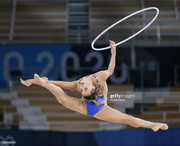
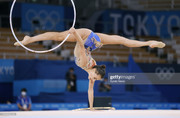

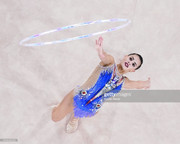
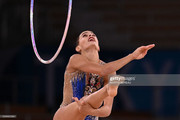

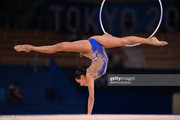
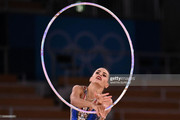
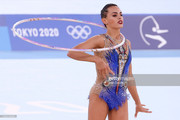

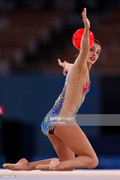
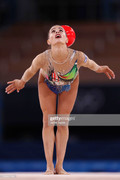
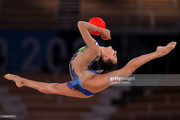
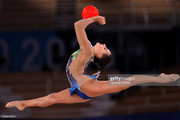
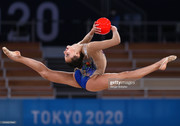
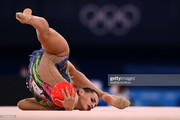


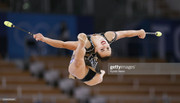

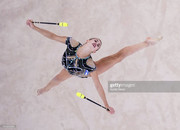

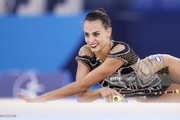
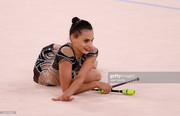
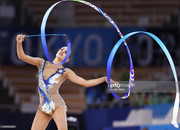

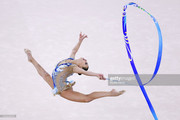



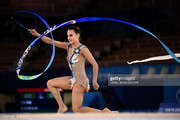
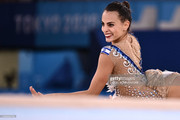


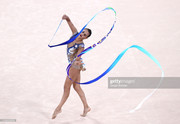
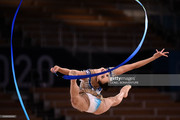
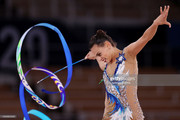
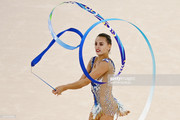

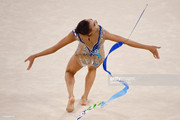

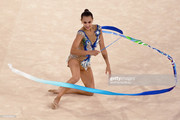
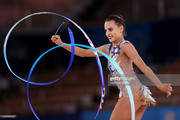
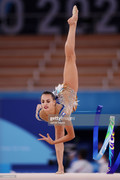

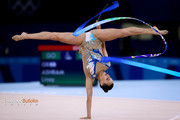
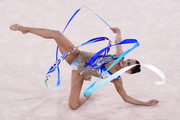
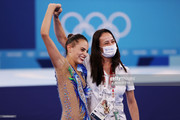



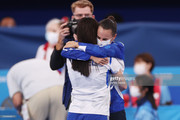

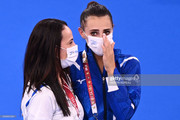
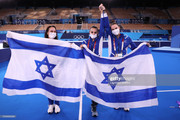










 me la ero persa...
me la ero persa...